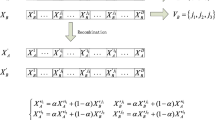Abstract
Based on the chaos movement and the clonal selection theory, a novel artificial immune system algorithm, Adaptive Chaos Clonal Evolutionary Programming Algorithm (ACCEP), is proposed in this paper. The new algorithm uses the Logistic Sequence to control the mutation scale and uses the Chaos Mutation Operator to control the clonal selection. Compared with SGA and Clonal Selection Algorithm, ACCEP can enhance the precision and stability, avoid prematurity to some extent, and have the high convergence speed. The results of the experiment indicate that ACCEP has the capability to solve complex machine learning tasks, like Multimodal Function Optimization.
Similar content being viewed by others
References
Lü, J. H., Lu, J. A., Chen, S. H., Analysis and Applications of the Chaos Time Sequence (in Chinese), Wuhan: Wuhan University Press, 2002.
Choi, C., Lee, J., Chaotic local search algorithm, Artificial Life & Robotics, 1998, 2(1): 41–47.
Li, B., Jiang, W. S., Chaos optimization methods and applications (in Chinese), Control Theory & Applications, 1997, 14(4): 613–615.
Qi, A. S., Du, C. Y., Nonlinear Model of Immunity, Shanghai: Shanghai Scientific and Technological Education Publishing House, 1999.
Jiao, L. C., Du, H. F., Artificial immune system: progress and prospect, Acta Electronica Sinica, 2003, 31(10): 1540–1548.
Dasgupta, D., Forrest, S., Artificial immune systems in industrial applications, in Proceedings of the Second International Conference on Intelligent Processing and Manufacturing of Materials, New York: IEEE Press, 1999, 257–267.
de Castro, L. N., Von Zuben, F. J., The Clonal Selection Algorithm with engineering applications, in Proc. of GECCO’00, Workshop on Artificial Immune Systems and Their Applications, CA: Morgan Kaufman Publishers, 2000, 36–37.
Kim, J., Bentley, P. J., Towards an artificial immune system for network intrusion detection: an investigation of clonal selection with a negative selection operator, in Proceedings of the 2001 Congress on Evolutionary Computation, New York: IEEE Press, 2001, 1244–1252.
Du, H. F., Jiao, L. C., Wang, S. A., Clonal operator and antibody clone algorithms, in Proceedings of the First International Conference on Machine Learning and Cybernetics, New York: IEEE Press, 2002, 506–510.
Chen, G. L., Wang, X. F., Zhuang, Z. Q., Genetic Algorithm and Applications, Beijing: Posts and Telecom Press, 1996.
Luo, C. Z., Shao, H. H., Evolutionary algorithms with chaotic mutations (in Chinese), Control and Decision, 2000, 15(5): 557–560.
Liu, Y. G., Zhang, J. F., Pan, Z. G., Design of satisfaction output feedback controls for stochastic nonlinear systems under quadratic tracking risk-sensitive index, Science in China, Ser. F, 2003, 46(2): 126–144.
Li, K., Yang, L. X., He, Z. Y., Stability analysis of nonlinear observer with application to chaos synchronization, Science in China, Ser. F, 2001, 44(6): 430–437.
Author information
Authors and Affiliations
Corresponding author
Rights and permissions
About this article
Cite this article
Du, H., Gong, M., Liu, R. et al. Adaptive chaos clonal evolutionary programming algorithm. Sci China Ser F 48, 579–595 (2005). https://doi.org/10.1360/04yf0458
Received:
Issue Date:
DOI: https://doi.org/10.1360/04yf0458




